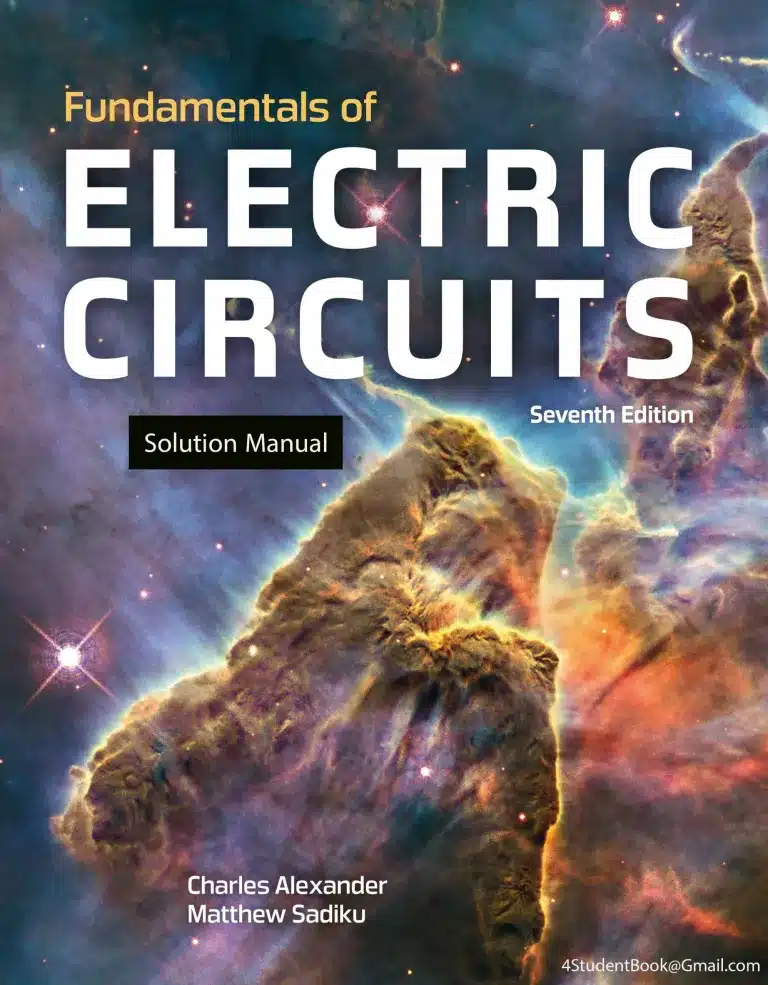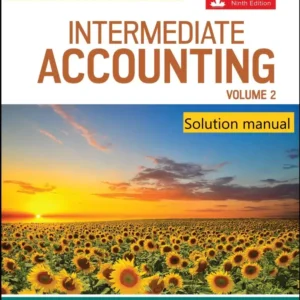Original price was: $39.99.$24.99Current price is: $24.99.
Solution Manuals for Fundamentals of Electric Circuits 7th Edition by Charles Alexander
Product ID: 0340, Downloadable link.
For Contact: bookzon.shop@gmail.com
Description
Solution Manuals for Fundamentals of Electric Circuits, 7th Edition by Charles Alexander
Overview of the 7th Edition of Fundamentals of Electric Circuits
The Fundamentals of Electric Circuits (7th Edition) by Charles Alexander and Matthew Sadiku builds on the success of previous editions, providing a comprehensive approach to circuit analysis. This edition is designed to present complex concepts in a clear and engaging manner, making it easier for students to grasp the material compared to more traditional textbooks.
Key Features of the 7th Edition
-
Balanced Approach to Circuit Theory: The text combines theoretical principles with real-world applications, extended examples, and practice problems.
-
Enhanced Problem Sets: This edition includes over 580 new or revised homework problems to reinforce learning.
-
Robust Media and Resources: A range of online media tools support this edition, making it the most student-friendly resource for learning linear circuit analysis.
Design Skills Development through ‘Design a Problem’
One of the highlights of this edition is the “Design a Problem” feature. This unique exercise encourages students to develop both the questions and the solutions, helping them to enhance their design and critical thinking skills. The 7th edition integrates over 100 “Design a Problem” exercises within the problem sets.
McGraw-Hill Connect Integration
The textbook is also accompanied by McGraw-Hill’s Connect, a digital platform that complements the Fundamentals of Electric Circuits. Connect offers:
-
E-Book Experience: Access to the entire textbook in a digital format.
-
Assignment & Assessment Tools: Professors can assign, assess, and automatically grade reading, homework, quizzes, and tests.
-
Enhanced Learning Features: Problems are randomized to prevent sharing of answers, and multi-step solutions guide students through challenging concepts.
Table of Contents: A Breakdown of Topics
Part One: DC Circuits
-
1) Basic Concepts: Introduction to essential circuit concepts.
-
2) Basic Laws: An overview of the fundamental laws in electrical circuits.
-
3) Methods of Analysis: Approaches to analyzing electrical circuits.
-
4) Circuit Theorems: Common circuit theorems used in circuit analysis.
-
5) Operational Amplifiers: Working principles and applications of operational amplifiers.
-
6) Capacitors and Inductors: Behavior and applications of capacitors and inductors in circuits.
-
7) First-Order Circuits: Analysis of first-order linear circuits.
-
8) Second-Order Circuits: Introduction to second-order circuits and their behavior.
Part Two: AC Circuits
-
9) Sinusoids and Phasors: Understanding the representation of alternating current using sinusoids and phasors.
-
10) Sinusoidal Steady-State Analysis: Techniques for analyzing sinusoidal steady-state circuits.
-
11) AC Power Analysis: Analyzing power in AC circuits.
-
12) Three-Phase Circuits: Principles and applications of three-phase electrical systems.
-
13) Magnetically Coupled Circuits: Examining circuits with magnetic coupling.
-
14) Frequency Response: Understanding the response of circuits at different frequencies.
Part Three: Advanced Circuit Analysis
-
15) Introduction to the Laplace Transform: Overview of Laplace transforms and their application in circuit analysis.
-
16) Applications of the Laplace Transform: Practical applications of the Laplace transform in solving circuit problems.
-
17) The Fourier Series: Introduction to Fourier series for analyzing periodic functions.
-
18) Fourier Transform: Using the Fourier transform to analyze non-periodic signals.
-
19) Two-Port Networks: Study of two-port network models for analyzing complex circuits.
Why Choose Fundamentals of Electric Circuits (7th Edition)?
This edition of Fundamentals of Electric Circuits offers a modern and comprehensive approach to learning circuit analysis. With its perfect blend of theoretical knowledge, practical examples, and digital resources, it stands as a leading choice for students and professors aiming to master electrical circuit analysis. The integration of McGraw-Hill’s Connect provides a valuable online platform to enhance both learning and teaching experiences, making it a versatile resource for academic success.
To view more manual solutions, click here.






Clear methodology
Covers details
Highly effective
Matches the exam
Helps retention
Logical arrangement
Up-to-date